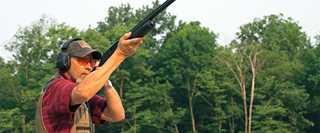Essential Gear for Shooters
These must-have items will enhance your shooting experience on any clay target course
These must-have items will enhance your shooting experience on any clay target course

By Phil Bourjaily
You can plunge into the clay target sports with nothing but a shotgun, earplugs, and safety glasses. However, picking up a few more items won't cost you much and will make your time at the range more enjoyable. Once you get hooked, you can save up for premium shooting glasses, electronic hearing protection, and more. But for now, focus on basic shooting accessories.
Eye protection isn't optional. It shields you from target shards, flecks of hot powder, and freak ricochets. Even a pair of $15 shooting glasses will provide good protection at the range. Shooting glasses can also help you see targets better, and various tinted lenses let you see them under different light conditions. Orange- and rose-colored lenses make orange targets stand out and are a good all-around choice. Gray, purple, or brown lenses work well in bright sun; yellow is good in haze; and clear is best at night. Choose the lightest tint that you can use without squinting. Dark glasses only make targets harder to see. Glasses with prescription inserts, even bifocals, are also available.
Ear protection is mandatory too. Most clubs sell foam earplugs, which provide excellent protection when used according to directions. Molded earplugs have the added advantage of being impossible to insert incorrectly, so you always get the full benefit of protection. Advanced models, which are more expensive, feature microphones that amplify normal sounds but shut off to block loud noises. Wearing earmuff protectors over earplugs provides perhaps the best protection. Amplified muffs have become very inexpensive, and they let you hear while still protecting your ears. I have always doubled up with foam earplugs and electronic muffs at the range, and while my hearing isn't improving, I can hear much better than some of my friends.
Shell pouches are a must for trap and skeet, which require you to carry a box of shells from station to station. A simple $20 divided pouch will hold a box of shells, a few extra cartridges, and your empties.
Shooting vests come with pockets that are tailored to carry shells, choke tubes, and glasses. Many vests also come with built-in shoulder padding to soften recoil, pouches in the back to hold empties, and D-rings for securing keys and various accessories.
Range bags are handy for carrying your gear to the trap or skeet field, as well as around the sporting clays course, where you'll be far from your vehicle. I use an old blind bag that holds five boxes of shells, a breakdown cleaning rod for clearing wads lodged in the barrel, and a punch to remove autoloader trigger-group pins. The bag is large enough to hold additional items, such as a rag and some Hoppe's Gun Medic, choke tubes, a multitool, water, and sunscreen.
Hard gun cases are perfect for transporting guns to the range. Some shooters like to protect their gun with a sleeve or soft case as they walk the sporting course. I usually don't, unless I bring an extra gun, which I'll leave in the case and sling over my shoulder.
Shell catchers are essential gear for trap shooting with an autoloader. Some of these devices clip onto the receivers of many popular guns, while others attach even more universally with sticky tape. Rubber bands and hair ties will work in a pinch.
Clay carts make it much easier to transport multiple guns and other gear around a shooting range. The carts, which look like strollers, are especially useful on sporting clays courses.
Hearing Protection in the Field
Hearing protection is just as important in the blind as it is on the range. Gunshots echoing under a blind roof or even just a single muzzle blast near your ear can permanently damage your hearing. If I expect to shoot a lot-during teal or dove season, for example-I'll wear foam plugs. In the blind, however, I'll wear mechanical ear valves like the old Lee Sonics, so I can hear normal conversation. The best and most expensive solution is a pair of amplified earplugs that will let you hear whistling wings, honking geese, and duck blind jokes-both now and in years to come.

Ducks Unlimited uses cookies to enhance your browsing experience, optimize site functionality, analyze traffic, and deliver personalized advertising through third parties. By continuing to use this site, you agree to our use of cookies. View Privacy Policy